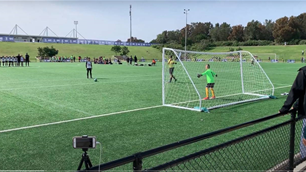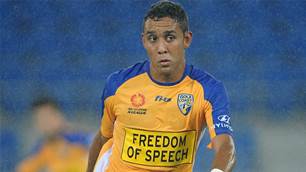CAPITAL Football has set its sights on a team in the National Youth League after shelving plans for an A-League squad in the foreseeable future.
The federation is working on getting a youth team up and running in the national comp within the next three years.
Chief Executive Heather Reid told au.fourfourtwo.com it was a realistic and financially viable way to expand the Canberra United brand.
The capital city runs a standalone outfit in the W-League and is hoping to achieve something similar in the youth comp.
The proposal means providing an avenue for young local footballers separate to the AIS NYL team which is based in Canberra but draws players from all over the country.
“Our priority is actually to work towards a licence for the National Youth League which we believe that’s a more feasible achievement for us,” Reid said.
It’s not the first time Canberra has courted a youth league licence. Back in 2009 the capital city was reportedly on the verge of entering the youth comp, seen as a stepping stone for the establishment of a local A-League side.
Canberra has been a rich source of elite players for the A-League with the likes of former Central Coast Mariners playmaker now Celtic recruit, Tom Rogic, Steve Lustica (Brisbane Roar) and Nikolai Topor-Stanley (Western Sydney Wanderers) originating from the inland city.
But in May last year the bid for topflight football was officially declared dead and buried when Western Sydney won the race for an A-League licence. The FFA have since made it clear any further expansion is on the back burner.
At least $150,000 of unclaimed money paid to the A-League bid consortium from foundation members is now due to be handed over to Capital Football for the development of elite men’s football.
It could help lay the foundations for a NYL side.
Reid added: “We believe we’ve got the capacity to have a National Youth League team.
“This season we’ll have a team playing in the NPL U20s as Youth United, they will underpin the AIS who will be playing in our first division premier league.
“So it will be AIS in the first division, Youth United in the U20s and then the ACT Academy of Sport boys will be in the U18s.
“At the same time we will continue to work with and negotiate with FFA to give us a licence for our own Canberra United NYL team.”
The federation hopes to schedule games between Youth United and NYL teams in the summer to provide local players with valuable match experience. In the long run they are hoping to mirror the academy structures established by the Newcastle Jets and Central Coast Mariners.
“It’s something that’s encouraging because we’re getting on a similar page as the other federations with our youth development,” Reid said. “But what’s missing is that team in our own right to play in the National Youth League.
“We do have a great relationship with the AIS football program where our best five or six male players have the opportunity to be part of that training environment and to be part of the AIS NYL team at the moment.
“So there is a little bit of a pathway for the boys directly in our backyard but clearly we would like our own standalone pathways under Canberra United in the future.”
With Capital Football entering the National Premier Leagues this year, and a youth league team on the radar, the federation is hopeful it will address, in part, the gap in elite pathways for boys and men.
Reid believes being part of the “bigger picture” will inspire young players.
“I think the really exciting thing is for the kids in U12s and U14s when they realise they’re no longer just Capital Football Premier League they’re actually part of a National Premier League,” she said
“Hopefully they will aspire to remain in their club so that when they’re old enough we’ve got a strong champions league when the best teams from each of the federations plays off against each other.
“And that we’ve also got a strong FFA Cup competition that drills down into a broader level of club participation within the NPL structure.”
Meanwhile the federation is looking to introduce an U20 community league to stop the drift of young men out of the game when they leave school.
Set up as a transition league between the junior and open age teams it will target institutional clubs representing universities and the defence forces with, perhaps, a break in July to fit in with the main university holidays.
Reid said it was a matter of thinking strategically to meet the needs of the participants.
Related Articles

Fresh talent flock to ambitious A-League outfit's pro pathway

Why A-League 20/21 is crucial for Olyroos’ medal hopes













